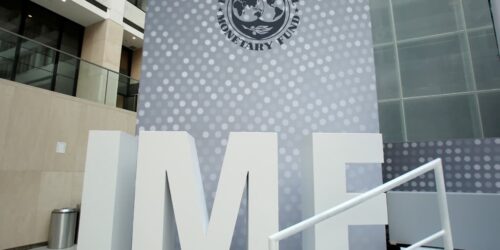The International Monetary Fund (IMF) has asked Pakistan to withdraw around Rs300 billion sales tax exemptions to qualify for the next loan tranche of $1 billion, taking the demand for the additional revenue requirements to over Rs525 billion.
The tax authorities have shown willingness to take back nearly Rs260 billion sales tax exemptions as a quid pro quo for not imposing additional income taxes on the salaried class, government sources told The Express Tribune on Friday.
Pakistani negotiators hinted at withdrawing the sales tax exemptions with immediate effect but requested the IMF to delay salaried class income tax-related measures till the next programme review that could take place around March, said the sources.
The Express Tribune had reported on Thursday that the IMF asked Pakistan to impose over Rs225 billion income taxes, including change in tax rates for the salaried class.
Demand for roughly Rs525 billion additional tax measures has been put forward by the IMF during technical-level talks that continued from Monday to Friday. Some of the power sector and budget-related issues remained pending, which would be discussed today (Saturday).
Subject to consent by the political leadership to take these unpopular measures, the government will have to promulgate a Presidential Ordinance to give effect to new tax measures. However, the final decision about the IMF conditions that Pakistan will accept is expected to be taken in Washington during the upcoming visit of Finance Minister Shaukat Tarin.
Read More: IMF seeks Rs225b more in income taxes
The sources said that the IMF authorities wanted to partially reverse the imbalance between the direct and indirect taxes by expanding the web of income taxes. At present, the collection of direct taxes is hardly 35% of the total taxes, which is putting undue burden on the lower middle-income groups.
One of the possibilities was that the government may try to impose income tax on these sectors, which under the Constitution and law cannot be taxed by the federal government, the sources said. They said that there was a possibility to tax some of these sectors without disturbing the constitutional arrangement.
The IMF or no IMF, the sales tax exemptions that are mainly availed by the influential lobbies cannot be defended and justified, the sources added.
The sources said that the goods that are entitled to zero-rating regime, complete sales tax exemptions and reduced tax rates came under discussion during these talks. The sources said that the tax authorities agreed to withdraw sales tax exemptions at the import stage but were reluctant to accept the demand to withdraw all domestic sales tax exemptions.
The authorities were of the view that many items will be charged at 17% sales tax at the import stage but few will be shifted to a zero-rating regime.
However, the final decision will be taken by Prime Minister Imran Khan.
The withdrawal of sales tax exemptions could fuel inflation, as the industrialists who have been availing these exemptions would prefer to pass on the impact on consumers instead of taking a hit on their revenues. Despite reduction in taxes on some of the construction materials, their prices have increased due to the weak regulatory regime in Pakistan.
There was also a possibility that the government may charge standard 17% sales tax on mobile phones to get additional revenue of Rs27 billion.
The tax expenditure report for fiscal year 2020-21 that the finance ministry released in June showed that the annual cost of tax exemptions being given to various segments of the society and foreign investors jumped to a new record of Rs1.31 trillion – an increase of over 14% within a year.
The government had lost Rs578.5 billion worth of revenue due to sales tax exemptions, which was Rs518 billion a year ago. There was 11.5% or Rs60 billion increase in the cost of sales tax breaks within one year. The share of sales tax exemptions were about 44% of the total tax exemptions.
An amount of Rs12.9 billion was lost on account of exemptions on products which were protected under the Fifth Schedule of Sales Tax Act. The fifth schedule relates to the zero-rated tax system.
There was a significant reduction in exemptions given to importers that dropped to Rs174 billion from Rs256 billion a year ago. The Rs156 billion exemptions were given on local supplies, which were three times more than the last fiscal year.
The government also charges reduced sales tax rates on various goods, which has cost Rs208 billion in this fiscal year – up from Rs83 billion a year ago. These exemptions are given under the Eighth Schedule of the Sales Tax Act, which allows imposition of lower than standard 17% sales tax







